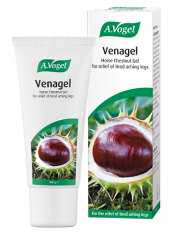Swollen feet at night
Many people experience swollen feet at night – particularly those with less active lifestyles. There are a number of reasons why your feet might swell at night, but the three most common ones are: being too warm, not drinking enough water during the day, and having varicose veins.
This combination means that you are more likely to experience this symptom during the summer months, as this is when you are more likely to be too hot and dehydrated, and when your varicose veins are more likely to be aggravated.
My Top Tip: Venagel provides relief from symptoms associated with varicose veins such as swelling in the legs. It can be used during pregnancy, in hot weather and while travelling to cool heavy, tired legs. Venagel provides relief from symptoms associated with varicose veins such as swelling in the legs. It can be used during pregnancy, in hot weather and while travelling to cool heavy, tired legs.
|
What causes swollen feet at night?
Being too warm – When our bodies start to become too warm, our natural cooling mechanism kicks in. Our blood vessels dilate, and more blood is pushed to the surface of the skin (hence why your skin goes red when it’s warm). The process of sweating cools the surface of the skin, and so cools the blood running underneath. This cooler blood is taken back into the body and more blood is sent to the surface to cool.
In dilating the blood vessels, this allows a greater volume of blood to pass through the vessels. This can become a problem for your feet because they have to work harder to pump all this extra blood back up to the heart. If they can’t manage this, then fluid can begin to leak out of the vessels and into the surrounding tissue – causing swelling. This is perfectly natural and nothing to worry about – your feet won’t explode!
Not drinking enough water – When we don’t drink enough water during the day, our bodies become dehydrated. This means that our salt to water ratio gets thrown out of balance, and we end up with too much salt. In order to correct this imbalance, our bodies begin to retain water.
This is particularly noticeable at the end of the day if you have spent a lot of time standing or sitting still, as this water gets pulled down by gravity, towards the feet.
Varicose veins – One of the secondary symptoms of varicose veins is swelling in the ankles and feet. This is due to the nature of varicose veins – they are damaged, swollen veins that, because of their damaged valves, struggle to pump water against gravity from the feet to the heart. As excess blood and fluids begin to pool in the feet and ankles, swelling occurs.
This gets worse when you are warm because of the dilation of your blood vessels, which puts extra pressure on these damaged veins by pushing a larger volume of blood through them. For more about how heat can make your varicose veins worse, read my blog post on this topic.
What you can do about it
There are a number of things you can do to prevent and ease your swollen feet at night:
- During the day, try to drink more water. This might seem silly when the cause of your swelling is excess fluid, but drinking water will balance your salt to water ratio, and prevent you from retaining water. You should be drinking between 1.5 and 2 litres of water a day. Read our article about how much water you should be drinking for some more advice
- Try to keep cooler at night. Switch to lighter duvet, use cotton sheets and pyjamas instead of synthetic ones, and try opening a window or using a fan. For some more tips, read our 7 tips to keep cool at night
- Elevate your feet. If you elevate your feet above your heart, this allows blood and fluid to flow with gravity away from the feet. Do so before going to bed to reduce uncomfortable swelling, or sleep with your feet propped up on a pillow to prevent swelling occurring during the night
- Try to get some exercise in during the day. Moving your legs stimulates blood flow and stops swelling from occurring. A brisk walk, jogging, swimming or yoga can help boost circulation. If you sit at a desk all day, try our leg exercises that you can do from your desk
- Reduce your salt intake. As we discussed earlier, swelling can occur when your salt to water ratio is thrown out of balance – and this can be caused be consuming too much salt as well as too little water. Try Herbamare, a delicious seasoning that is low in sodium, but still makes food taste great!
Are there any herbal remedies that might help?
Yes, there are a number of herbal remedies that can be used to reduce this problem.
For soothing and cooling warm legs, I recommend Venagel, a gel extract of horse chestnut. Rub it in upwards motions to stimulate flood flow and drain excess fluids.
If varicose veins are the cause of your swelling, you could also try Venaforce. These tablets contain an extract of horse chestnut which helps to relieve the symptoms of varicose veins.








